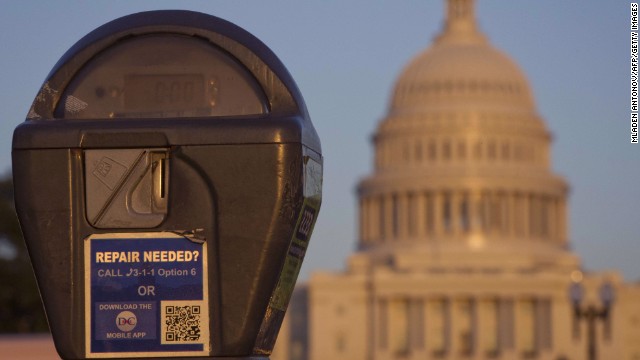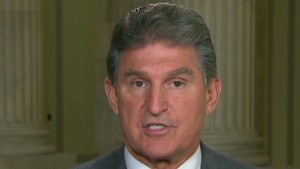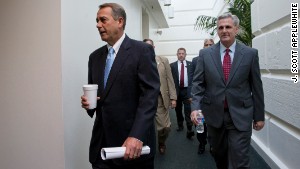U.S. faces debt ceiling crash at stroke of midnight

Cutter to King: This is a fool's errand
STORY HIGHLIGHTS
- Republican representative hopes Speaker Boehner will fast-track possible Senate deal
- Spokesmen: Sen. Reid and Sen. McConnell resume talks to end the standoff
- The GOP-led House's vote to end shutdown, raise debt ceiling called off
- Obama says House Speaker Boehner can't control his own caucus
The deal-making resumes Wednesday, and there is hope, as the government slides into day 16 of the shutdown.
Legislators dropped hints
on their way home Tuesday that Senate leaders will present a deal to
raise the debt ceiling and reopen the partially shuttered government.
And a Republican member
of the House of Representatives is holding out hope that Speaker John
Boehner could put it on a fast track.
After adjourning the
Senate for the night around 10 p.m. Tuesday, majority leader Sen. Harry
Reid sounded upbeat. "We're in good shape," the Nevada Democrat said.
Senate staffers burned
midnight oil to draft a framework bill, and a spokesman for Reid said he
and his counterpart, minority leader, Republican Senator Mitch
McConnell, "are optimistic that an agreement is within reach."
The Senate isn't in
session until noon Wednesday, but it's possible that statements may go
out in the morning in an effort to assure the markets of progress.
Slow process
Even so, it could take a
day or two more for a deal to make it through the legislative process,
longer than it will take for the debt ceiling to come grinding down.
 Manchin: A deal can happen in Senate
Manchin: A deal can happen in Senate
 Boehner: Idea of default is wrong
Boehner: Idea of default is wrong
If a new bill hits walls, as in the past, it could take even longer, pushing the U.S. into default.
The prospect of the U.S. government not meeting its debt obligations has economists around the world prophesying dire consequences. Mutual funds, which are not allowed to hold defaulted securities, may have to dump masses of U.S. Treasuries.
Ratings agency Fitch fired a warning shot Tuesday
that it may downgrade the country's AAA credit rating to AA+ over the
political brinksmanship and bickering in Washington that has brought the
government to this point.
That could help raise interest rates on U.S. debt, putting the country deeper into the red.
Rating agency Standard
& Poor's cut the U.S. credit rating from AAA to AA+ following the
2011 debt ceiling crisis. Moody's still has the U.S. rated AAA.
Fast track
Boehner could put a
Senate deal on a fast track, a Republican colleague told CNN's Jake
Tapper. But he'd have to make a bold political move to do so.
"I believe that John
Boehner will likely be in a position, where he will have to essentially
pass the bill that is negotiated between Senators McConnell and Reid,"
said Republican Rep. Charlie Dent of Pennsylvania.
Then Boehner could shoot it over to the Senate for its quick approval, and it could then lateral it to President Obama to sign.
 Military cemeteries closed around world
Military cemeteries closed around world
 Wounded Warrior Project steps in
Wounded Warrior Project steps in
But Boehner would probably have to break a Republican tradition, the Hastert Rule, to do that.
The informal tenet,
named after former Speaker Dennis Hastert, says that the House Speaker
does not introduce legislation, unless a majority of Republicans say
they will vote for it first.
It has served to keep
proposals off the floor, even if they have the prospect of passing via
the votes of Democrats combined with those of some moderate Republicans.
House Republicans have
expected Boehner to uphold the rule, which asserts the party's interests
in the chamber, and he has pledged to do so.
A break from tradition
Dent hopes Boehner will
make an exception and break the Hastert Rule to save the United States
from a debt default, and he fears the Speaker will have to, if he wants
the necessary legislation to pass.
Although many of his
House Republican colleagues support the potential Senate deal, some
would vote against it for political reasons, Dent said.
"There will be fewer
Republican members voting for the bill than who actually support it,"
Dent told Tappert on the Capitol Hill lawn. "We're going to be seeing a
lot of what I would call 'hope yes, vote no.'"
That would leave it up
to the Democrats to pass it along with a contingency of Republicans like
himself, provided Boehner puts it to a vote.
If he does, Dent will
vote in favor of it alongside many House Democrats, and he thinks enough
of his moderate Republican colleagues will join him to "put it over the
top."
"The question is how many Republicans? Will it be closer to 20 or 75," Dent said. "I don't know. I hope I'm wrong."
Dent says he feels that
it is his basic duty to fund the government and keep it able to pay its
debts. He believes that the majority of House Republicans feel the same
way.
"The challenge is (that)
there are two to three dozen members of the House Republican caucus
that don't share that," he said. "It only takes two or three dozen to
obstruct the will of the majority.
No comments:
Post a Comment